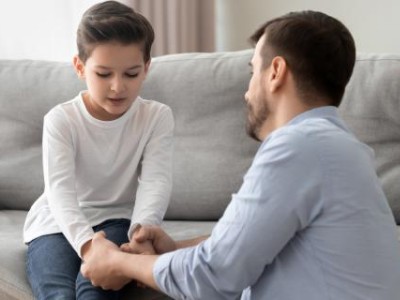Protecting Children, Saving Precious Lives
If you or someone you know is in immediate danger of self-harm, call 911 or go to the nearest emergency department.
You are not alone. To talk with someone now, call 988. The new 988 dialing code offers a convenient way to reach the Suicide and Crisis Lifeline, formerly known as the National Suicide Prevention Lifeline. Call 988 from anywhere in the U.S. anytime for free, confidential support.
Arizona’s Teen Lifeline: Staffed by and for Teens
1-602-248-8336 (TEEN) – Inside Maricopa
1-800-248-8336 (TEEN) – Outside Maricopa
An alarming number of young people are struggling with feelings of helplessness, depression and thoughts of suicide. Centers for Disease Control and Prevention (CDC) data found that nearly one in five children had a mental, emotional or behavioral disorder, but only about 20 percent received care from a specialized mental health care provider.
“Talk to your children about their feelings and struggles,” suggests Carla Allan, PhD, chief of Psychology at Phoenix Children’s. “This is our opportunity to reduce the stigma around reaching out for mental health care. By listening, maybe doors will open, and a life can be positively impacted.”
Whether they’re facing trauma from child abuse or loss of a family member or everyday anxiety about the COVID virus and unpredictable routines, kids need more support now – among a more significant shortage of children’s mental health resources. Overwhelmingly, the pandemic has affected the daily lives of many of our youth – with many being less motivated to do regular routines and even activities they typically enjoyed.
“When I meet kids and learn their stories, there is something so beautiful and vital about each and every soul,” said Dr. Allan. “Every child has a unique ability to change the world, to gift us with something only they can bring. Our youth are our best hope for the future. How can we protect and empower them to grow through tough times?”
Phoenix Children’s wants to ensure that children and families across the region have access to mental health care and support – when and where they need it. To that end, Phoenix Children’s is collaborating with our community partners, creating new relationships and expanding educational programs to ensure that kids are cared for quickly, effectively and with compassion in the most appropriate setting.
Phoenix Children’s Internal Resources and Partnerships
Children and families deserve access to mental health care and support when and where they need it most. That’s why Phoenix Children’s is building stronger connections across the region to expand educational programs and ensure kids are cared for quickly, compassionately and in the most appropriate setting.
When a child comes to our Emergency Department (ED) experiencing a mental health crisis, they are stabilized and treated quickly and then referred to the Bridge Clinic, which connects them with the most appropriate community pediatric provider for long-term care. Among the patients treated through the Bridge Clinic, we have seen a marked decrease in return visits to the ED, indicating these patients have received high-quality care and referrals to community-based support.
Adverse childhood experiences (ACEs), such as abuse, neglect or witnessing violence, can cause serious, but preventable, complications in children and teens. They can affect a child’s ability to learn, function and thrive. If left untreated, they may contribute to long-term health issues, substance use, addiction and even suicide risk.
The Center for Resiliency and Wellbeing at Phoenix Children’s supports children from ages 1-18 who have experienced trauma. Our pediatric specialists use effective, evidence-based approaches to care for these children. Services include educational resources, evaluation, resiliency counseling and multispecialty treatments. The goal is to help children strengthen resiliency – the ability to face adversity and return to a healthier, more hopeful place.
The Injury Prevention Program provides resources and education to keep children safe, including gun safety initiatives and suicide prevention strategies. Families are equipped with tools to reduce risks and create safer environments.
Thousands of young people in Phoenix lack stable, safe housing, and many urgently need medical care. Since 2000, Phoenix Children’s has delivered care directly to at-risk youth through the Crews’n Healthmobile, a 35-foot mobile medical unit (MMU). The program, initially launched in partnership with the Children’s Health Fund and HomeBase Youth Services, has grown into a vital resource for at-risk children, teens and young adults.
Now fully operated by Phoenix Children’s, the program has expanded from a single MMU running four weekly clinics to a network of three MMUs and three fixed-site clinics. Crews’n Health provides respectful, compassionate and comprehensive care that brings hope to youth experiencing homelessness.
In 2021, Phoenix Children’s and ASU developed a partnership to address mental health challenges impacting families. The university’s School of Social Work has 10 students who began a yearlong internship program at Phoenix Children’s, where they work alongside behavioral health specialists to learn effective ways to support children and families.
Phoenix Children’s Pediatrics offers behavioral health services at locations throughout the Valley. Your child’s regular wellness visits are a natural time to check in on how your child is feeling, both physically and emotionally. If you ever have concerns about your child’s mental health, don’t wait to reach out. Your pediatrician is here to listen, answer your questions and connect your family with trusted resources.
Behavioral and Mental Health Services
Emotional well-being is just as important as physical health. That’s why Phoenix Children’s Pediatrics offers behavioral health services at all our locations. With a referral, your child can meet with an on-site behavioral therapist who provides caring support in a safe, welcoming environment. We help children who are:
- Feeling anxious, sad, lonely or easily overwhelmed
- Struggling with relationships at home or school
- Frequently missing school
- Irritable, angry or stressed
- Having obsessive thoughts that are hard to control
- Frequently ill or in pain
- Experiencing bedwetting or loss of bladder control
- Going through a lifestyle change (differences in eating, sleeping or exercising)
- In behavioral treatment for chronic health conditions
- Having headaches, stomachaches or trouble sleeping without a clear medical reason
Talk with your pediatrician today about getting a referral for your child.
Phoenix Children’s is the Official Pediatric Medical Partner of Phoenix Rising FC, Arizona’s highest-level professional soccer team. Our partnership raises awareness about youth mental health and builds community partnerships to extend support.



